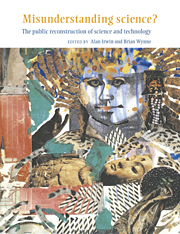Book contents
- Frontmatter
- Contents
- Acknowledgements
- Introduction
- 1 Misunderstood misunderstandings: social identities and public uptake of science
- 2 Science and Hell's kitchen: the local understanding of hazard issues
- 3 Disembodied knowledge? Making sense of medical science
- 4 Now you see it, now you don't: mediating science and managing uncertainty in reproductive medicine
- 5 Ignoring science: discourses of ignorance in the public understanding of science
- 6 Insiders and outsiders: identifying experts on home ground
- 7 Authorising science: public understanding of science in museums
- 8 Nature's advocates: putting science to work in environmental organisations
- 9 Proteins, plants, and currents: rediscovering science in Britain
- Conclusions
- Notes on contributors
- Select bibliography
- Index
3 - Disembodied knowledge? Making sense of medical science
Published online by Cambridge University Press: 16 October 2009
- Frontmatter
- Contents
- Acknowledgements
- Introduction
- 1 Misunderstood misunderstandings: social identities and public uptake of science
- 2 Science and Hell's kitchen: the local understanding of hazard issues
- 3 Disembodied knowledge? Making sense of medical science
- 4 Now you see it, now you don't: mediating science and managing uncertainty in reproductive medicine
- 5 Ignoring science: discourses of ignorance in the public understanding of science
- 6 Insiders and outsiders: identifying experts on home ground
- 7 Authorising science: public understanding of science in museums
- 8 Nature's advocates: putting science to work in environmental organisations
- 9 Proteins, plants, and currents: rediscovering science in Britain
- Conclusions
- Notes on contributors
- Select bibliography
- Index
Summary
The cloth of meaning may have to be woven out of a myriad scraps and off cuts, but woven it is, day after day, year after year.
This chapter addresses the issue of public understandings of science through a study of the ways patients with a genetic metabolic disorder make sense of the medical sciences they encounter. This disorder is ‘peculiarly scientific’ in that although it is strongly associated with premature death from cardiac arrest, it does not in itself produce obvious, subjectively discerned symptoms. Indeed, as far as the patient, and most probably his or her general practitioner, are concerned, even those external indicators of the disorder that may be present are unlikely to be seen as significant. Thus prior to the onset of coronary heart disease and/or a heart attack, the disorder may have no embodied presence in the daily life of the individual; instead it is called into existence through laboratory indicators, that is by the presence in a blood sample of raised levels of lipids (blood fats).
As a science concerned with human health, medicine has played a crucial role in representing science and technology in general to the public and in establishing their authority and status in contemporary society. While medical sociology has debated the sociological value of studying those whose disorder is medically defined, few studies have directly explored patients' interpretations of medical science itself. For social scientists interested in the public understanding of science, patients with such an abstract ‘disembodied’ disorder offer a rich point of inquiry.
- Type
- Chapter
- Information
- Misunderstanding Science?The Public Reconstruction of Science and Technology, pp. 65 - 83Publisher: Cambridge University PressPrint publication year: 1996
- 42
- Cited by



